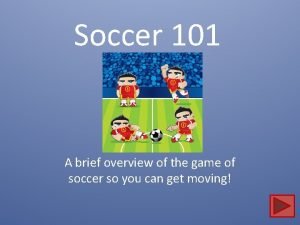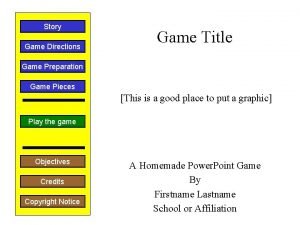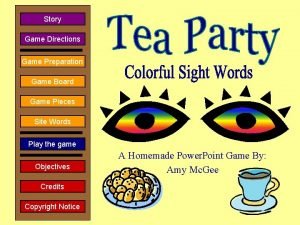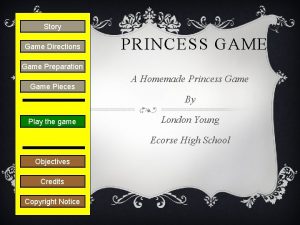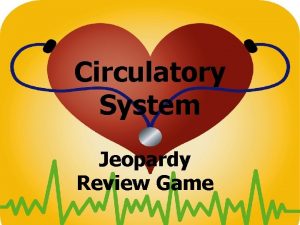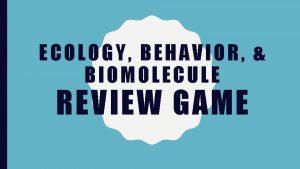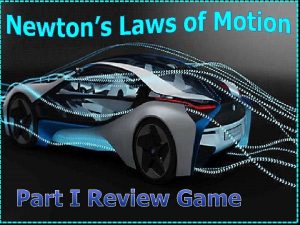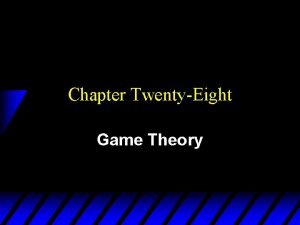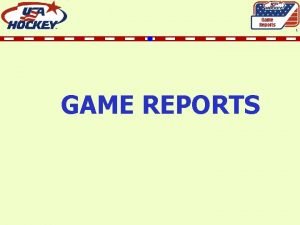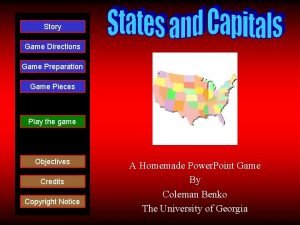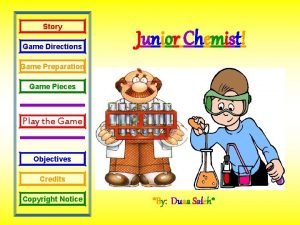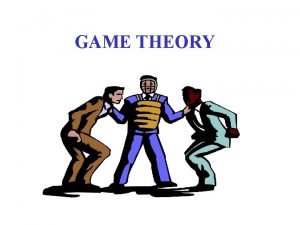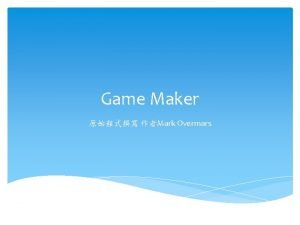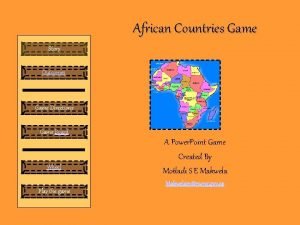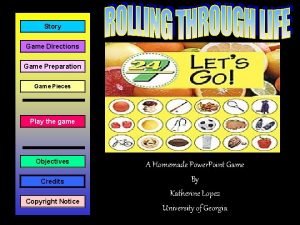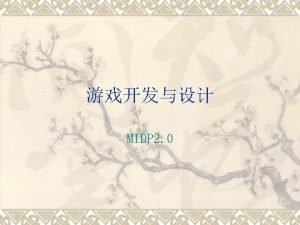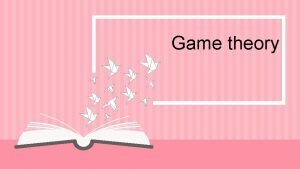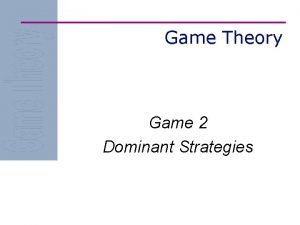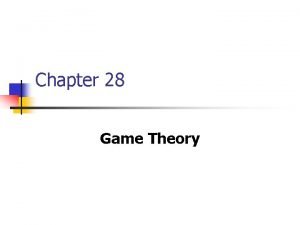Writing 101 Review Game Writing 101 The Writing



























- Slides: 27

Writing 101 Review Game

Writing 101: The Writing Process Q: During which part of the writing process do you decide on a purpose and audience for your writing? A: Brainstorming and Prewriting

Writing 101: The Writing Process Q: During which part of the writing process do you use your prewriting ideas to write your draft? A: Writing a First Draft

Writing 101: The Writing Process Q: During which part of the writing process do you Explore ideas about your topic (Brainstorm, Cluster, List, Etc. ) A: Brainstorming and Prewriting

Writing 101: The Writing Process Q: During which part of the writing process do you share your writing with the audience for whom you wrote it? A: Final Draft

Writing 101: The Writing Process Q: During which part of the writing process do you get your ideas on paper? A: Writing a First Draft

Writing 101: The Writing Process Q: During which part of the writing process do you ask yourself these questions about your draft? l What else will my audience want to know? l What details can I add? l How can I make my purpose clearer? l How can I make my writing easier to understand? l How can I improve the organization of my writing? A: Revising

Writing 101: The Writing Process Q: During which part of the writing process do you choose a topic that would be suitable for your purpose and audience? A: Brainstorming and Prewriting

Writing 101: The Writing Process Q: During which part of the writing process do you read your revised draft? A: Editing

Writing 101: The Writing Process Q: During which part of the writing process do you narrow your topic if it is too large for you to cover it well? A: Brainstorming and Prewriting

Writing 101: The Writing Process Q: During which part of the writing process do you read your draft and share it with someone else to get a response? A: Revising

Writing 101: The Writing Process Q: During which part of the writing process do you ask yourself these questions about your revised draft? l Have I followed correct paragraph form? l Have I used complete sentences? l Have I used capitalization and punctuation correctly? l Have I spelled all words correctly? A: Editing

Writing 101: The Writing Process Q: During which part of the writing process do you make a clean copy of your revised draft and proofread? A: Final Draft

Writing 101: The Writing Process Q: During which part of the writing process do you do not worry too much about making errors? A: Writing a First Draft

Writing 101: The Topic Sentence Q: What are the two parts of a topic sentence? A: The Topic plus Direction

Writing 101: RENNS Q: Fill in the blanks - “What separates most good writing from bad is the writer’s ability to move back and forth between ________ and __________. ” A: Main ideas and Specific details

Writing 101: RENNS Q: From the notes, what do we call the specific details in the body paragraphs? A: RENNS

Writing 101: RENNS Q: Fill in the blanks - RENNS support the _______. A: Main Idea

Writing 101: RENNS Q: For what does RENNS stand? A: Reasons, Examples, Names, Numbers, Senses.

Writing 101: Introductions Which is NOT an acceptable strategy for writing an introduction? A. Provide relevant background information B. Relate briefly an interesting story or anecdote C. Write statements about your purpose, such as “I am going to discuss the causes of falling oil prices. ” D. Give one or more pertinent statistics A: C

Writing 101: Introductions Which is NOT an acceptable strategy for writing an introduction? A. B. Ask one or more thought provoking questions Apologize, as in “I’m not sure this right, but this is my opinion. ” C. Use an appropriate quotation D. Define a key term A: B

Writing 101: Thesis Statement True or False The most specific sentence of your introduction will be your Thesis Statement. A: True

Writing 101: Introductions True or False Funnel Introductions start with a general statement about your topic. A: True

Writing 101: Thesis Statement True or False Thesis Statement should answer a single question that will give the main idea of your essay. A: True

Writing 101: Conclusions Which way is an acceptable strategy for writing a conclusion? Introducing new ideas or facts that belong in the body of the essay B. Rewording your introductions C. Making absolute claims, as in “I have proved that oil prices don’t always affect gasoline prices. ” D. A statement that looks ahead to the future A. A: D

Writing 101: Re-Stated Thesis True or False An inverted funnel conclusion should begin the most specific sentence of your conclusion. This sentence is called your Re-stated Thesis Statement. A: True

Writing 101: Re-Stated Thesis True or False According to your notes, you should restate your thesis, not repeat it. A: True
 Soccer 101 game
Soccer 101 game Hát kết hợp bộ gõ cơ thể
Hát kết hợp bộ gõ cơ thể Ng-html
Ng-html Bổ thể
Bổ thể Tỉ lệ cơ thể trẻ em
Tỉ lệ cơ thể trẻ em Voi kéo gỗ như thế nào
Voi kéo gỗ như thế nào Tư thế worm breton là gì
Tư thế worm breton là gì Chúa yêu trần thế
Chúa yêu trần thế Các môn thể thao bắt đầu bằng tiếng chạy
Các môn thể thao bắt đầu bằng tiếng chạy Thế nào là hệ số cao nhất
Thế nào là hệ số cao nhất Các châu lục và đại dương trên thế giới
Các châu lục và đại dương trên thế giới Cong thức tính động năng
Cong thức tính động năng Trời xanh đây là của chúng ta thể thơ
Trời xanh đây là của chúng ta thể thơ Mật thư tọa độ 5x5
Mật thư tọa độ 5x5 Phép trừ bù
Phép trừ bù Phản ứng thế ankan
Phản ứng thế ankan Các châu lục và đại dương trên thế giới
Các châu lục và đại dương trên thế giới Thể thơ truyền thống
Thể thơ truyền thống Quá trình desamine hóa có thể tạo ra
Quá trình desamine hóa có thể tạo ra Một số thể thơ truyền thống
Một số thể thơ truyền thống Cái miệng xinh xinh thế chỉ nói điều hay thôi
Cái miệng xinh xinh thế chỉ nói điều hay thôi Vẽ hình chiếu vuông góc của vật thể sau
Vẽ hình chiếu vuông góc của vật thể sau Biện pháp chống mỏi cơ
Biện pháp chống mỏi cơ đặc điểm cơ thể của người tối cổ
đặc điểm cơ thể của người tối cổ Thế nào là giọng cùng tên?
Thế nào là giọng cùng tên? Vẽ hình chiếu đứng bằng cạnh của vật thể
Vẽ hình chiếu đứng bằng cạnh của vật thể Tia chieu sa te
Tia chieu sa te Thẻ vin
Thẻ vin
